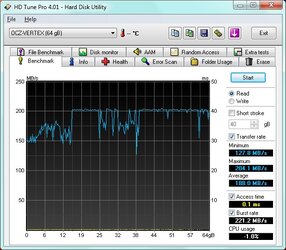- Joined
- Jun 4, 2010
- Location
- Greenfeild, IN
Hello, I purchased my Vertex 2 50gb 3 days ago, put my OS on it and it boots Windows fast as hell. But when I run HD Tune it says my SSD Reads at 186 MAX, 165 Average, 116 Min. These seem pretty low in my opinion, are they? I tested my RAID 0 with 2 1tb drives and its Average on HD Tune Pro is 198! Alot faster than my SSD. Whats up? My RAID Controller is ICh10R, and its set as RAID. I was told that the SSD perfomance wouldnt be effected by it being in RAID. That a problem?

